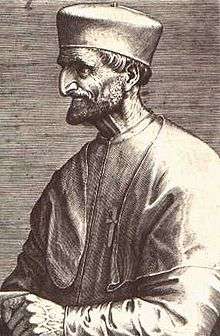Martín de Azpilcueta
Martín de Azpilcueta (Azpilikueta in Basque) [1] (13 December 1491 – 1 June 1586), or Doctor Navarrus, was an important Basque canonist and theologian in his time, and an early economist, the first to develop monetarist theory.

Life
He was born in Barásoain, Navarre, and was a relative of Francis Xavier. He obtained a degree in theology at Alcalá, then in 1518 he obtained a degree of doctor in canon law from Toulouse in France.[2] Beginning in 1524, Azpilcueta served in several canon law chairs at the University of Salamanca. From 1538 to 1556, he taught at Coimbra University in Portugal, at the invitation of the kings of Portugal and Spain.[3]
At the age of eighty he went to Rome to defend his friend Bartolomeo Carranza, Archbishop of Toledo, accused before the Tribunal of the Inquisition. Though he failed to exculpate the Archbishop, Aspilcueta was highly honoured at Rome by several popes, and was looked on as an oracle of learning and prudence. His humility, disinterestedness, and charity were proverbial.
Azpilcueta died in Rome at the age of 93.[4] He is buried in the national Church of San Antonio de' Portoghesi. Among other lives of Azpilcueta there is one by his nephew, prefixed to the Roman edition of his works.
Works
His Manual de confesores y penitentes (1549), originally written in Spanish, was enormously influential in the fields of canon law and ethics, and by the first quarter of the seventeenth century, it had gone through 81 editions.[5] The Manuel made an important step in the development of moral theology as its own discipline.[6] One of the four appendices Azpilcueta wrote for the Manuel, addressing exchange, supply and demand, and money, has recently been translated into English and published as On Exchange (2014).[7] In this work, Azpilcueta argued that the use of "money in exchanges is not unnatural," as Aristotle had claimed, and "put money on the same level as any other merchandise, and, consequently, established that the morality of exchanges did not depend on money as their object but on an equitable exchange."[8]
In his work on the revenues of benefices, first published in Spanish (Salamanca, 1566), translated into Latin (1568), and dedicated to Philip II of Spain and Pope Pius V, he maintained that beneficed clergymen were free to expend the fruits of their benefices only for their own necessary support and that of the poor.
He wrote numerous other works, e.g. on the Breviary, the regulars, ecclesiastical property, the jubilee year, etc. A complete edition of his works was printed at Rome in 1590 (3 vols. fol.); also at Lyons, 1590; Venice, 1602; and Cologne, 1615 (2 vols. fol.). A compendium of his writings was made by J. Dastellanus (Venice, 1598).
Time value of money
He allegedly invented the mathematical concept of the time value of money.
See also
- Doctrine of mental reservation
- Equivocation
- Tomás de Mercado another "Iberian monetarist"
- Pedro Agerre Azpilikueta, Basque prominent writer and maternal relative
References
- ↑ Aspilcueta, Azpilcoeta, Navarrus, Doctor Navarrus
- ↑ Martin de Azpilcueta, On Exchange. CLP Academic, 2014, p.xxii.
- ↑ Martin de Azpilcueta, On Exchange. CLP Academic, 2014, p.xxii.
- ↑ Martin de Azpilcueta, On Exchange. CLP Academic, 2014, p.xxii.
- ↑ Martin de Azpilcueta, On Exchange. CLP Academic, 2014, p.xxii.
- ↑ Martin de Azpilcueta, On Exchange. CLP Academic, 2014, p.xxiii.
- ↑ Martin de Azpilcueta, On Exchange. CLP Academic, 2014.
- ↑ Martin de Azpilcueta, On Exchange. CLP Academic, 2014, p.xxxiii.
- Giraud, Bibli. Sacr., II 334-336 (gives list of his writings)
- Hugo von Hurter, Nomenclator, (1892), I, 124-127
- Azurmendi, Joxe (2015): "Nafarroatik Nafarroara" in Pruden Gartzia: Nafarroako auziaz, Donostia: Elkar. ISBN 978-84-9027-443-9
- Attribution
 This article incorporates text from a publication now in the public domain: Herbermann, Charles, ed. (1913). "Martin Aspilcueta". Catholic Encyclopedia. New York: Robert Appleton.
This article incorporates text from a publication now in the public domain: Herbermann, Charles, ed. (1913). "Martin Aspilcueta". Catholic Encyclopedia. New York: Robert Appleton.